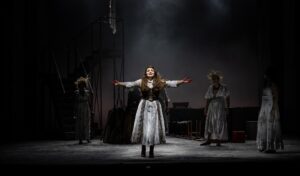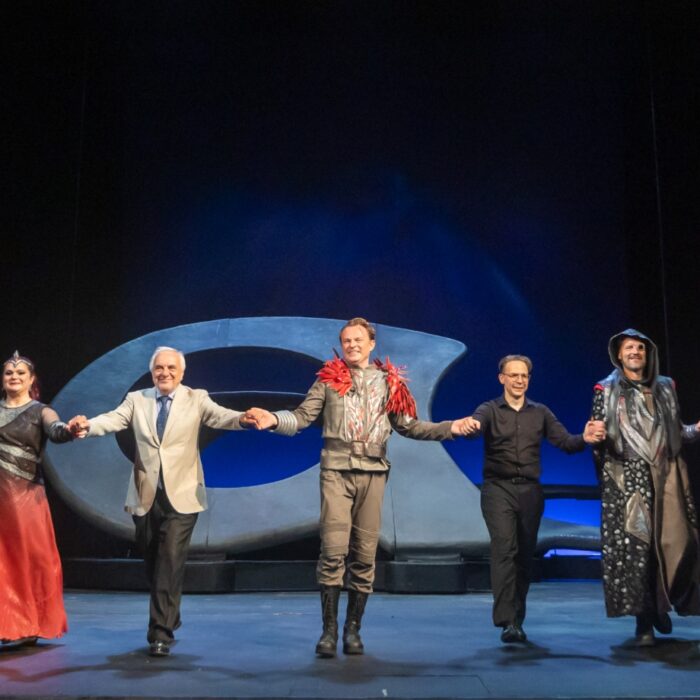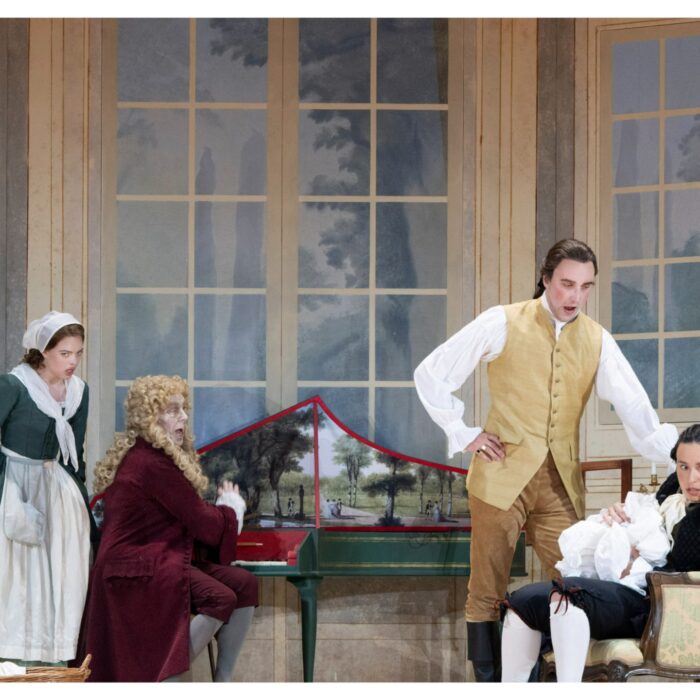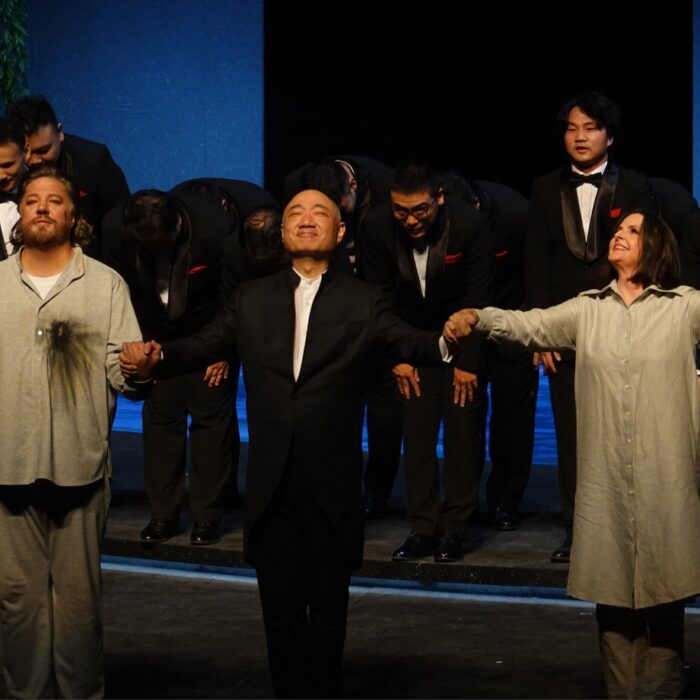
Wexford Festival Opera 2023 Review: L’Aube Rouge
Soare’s Stunning Performance Is Not Enough To Justify Further Perrformances
By Alan Neilson(Photo: Clive Barda)
It is inevitable, given the Wexford Festival Opera’s commitment to unearthing forgotten and neglected operas, that they will occasionally present a work that ends up flopping. While this was not the case with Camille Erlanger’s largely unknown “L’Aube Rouge,” it is unlikely to signal a change in its fortunes.
At best, Erlanger is now considered a minor composer of limited interest. His most successful operas, “La Juif Polonais” (1900) and “Aphrodite” (1906), although favorably received at Paris’ Opéra-comique, have long since disappeared from the repertoire. “L’Aube Rouge” similarly received positive reviews from the critics following its premiere in Rouen in 1911, but in this case, it never managed to find a place in the repertoire.
The Engaging Narrative is Given a Strong Staging
Certainly, the fault for the impression it made at the Wexford festival cannot be laid at the door of its librettists, Arthur Bernède and Paul de Choudens, who produced an engaging, balanced plot over four acts, which moved along at a pleasing pace.
The story starts in early 1900s Russia, with the smell of revolution hanging in the air. Olga, the daughter of the hated General Lovarov, has fallen in love with Serge, a nihilist student and leader of a revolutionary band. Their love, however, does not run smoothly, and in Act two Olga, who, having been persuaded that Serge has been shot dead by her father, finds herself in Paris about to marry Pierre de Ruys. Of course, Serge is still alive and turns up at the party. After a contretemps with De Ruys, Olga runs off into the night.
In Act three they are still in Paris, along with their band of revolutionaries, but in a heated argument with Vassili, a fellow revolutionary, Serge is shot and taken to the hospital. With his life hanging by a thread, only the surgeon can save him, who, by sheer chance, happens to be de Ruys. Finally, back in Russia, Serge, believing himself to have been saved in order to kill the Grand Duke, commits suicide by exploding a bomb close to the duke. Olga is distraught and dies of a broken heart.
It is a plot with plenty of dramatic incidents, and it is certainly able to hold the attention, which Ella Marchment did a fine job exploiting to bring about a strong staging. Taking her inspiration from “Romeo and Juliet,” she viewed the work as one woman’s struggle to do what was ever necessary to fashion a life with the man she loves. Their backgrounds, however, meant that they were on irreconcilable opposing sides of a conflict and were not fully trusted by anyone, which ultimately led to the lies that allowed Olga to accept the marriage to de Ruys and the suspicions of Vassili that ended with Serge being shot. Although she was wise not to make any direct references to such allusions in her staging, she successfully drew on the emotional power of Romeo and Juliet’s love to dictate much of Olga’s and, to a lesser extent, Serge’s behavior.
Her handling of the minor characters was also nicely managed. All were presented as relatively detailed, fleshed-out individuals, which helped create a rich context for the main drama to play out.
Holly Piggott, responsible for costumes and scenography, created a distinct set for each act, centered around a basic structure that included a staircase, which was used to allow significant characters to stand out from the crowd, but on occasions its function appeared to be little more than ornamental. No matter, it worked well in both cases. The opening two acts created a stark contrast that highlighted the differences between the “haves” and the “have nots,” adding to the context that gave rise to the people’s revolutionary feelings while also reaffirming Olga’s distinctly different background from Serge and the other revolutionaries. Her designs also ensured that the movement between locations was clearly presented while evoking a suitable atmospheric background to the action, which Piggott’s costume designs added to by matching them to the nature, role and status of the characters.
Daniele Naldi’s lighting designs worked well to support the dramatic effect; for example, when Serge exploded the bomb, he flooded the stage with an intense red light that jolted the senses.
The combination of all the elements came together neatly to support the drama in a clearly thought-through manner.
Soare’s Dominating Performance
Nor can the fault for the work’s inability to create a positive impression be attributed to the singers, who all produced strong performances.
The opera is dominated by the role of Olga, who is rarely off the stage and is at the centre of almost all of the major dramatic incidents. It is both an emotionally and technically demanding role, for which soprano Andreea Soare proved herself more than up to the task. By turn, she was loving, feisty, assertive and desperate; the emotions poured out to produce a breathtaking, compelling performance.
Her voice is wonderfully secure, able to move with an impressive degree of flexibility across the range, seamlessly incorporating leaps and intricate chromatic passages into the line, and able to push forcefully into her upper register without any sense of vocal anxiety. It is also a lyrically appealing voice that allows her to spin out long lines of intense beauty.
Time and time again, it was the expressivity of her singing, in which she delved deeply into Olga’s strongly felt emotions that caught the attention. Her confrontation with de Ruys was so intensely expressed that one assumed she was about to become physically violent. When begging Serge not to assassinate the Grand Duc, her pain and fears were seared into her voice. And on realizing that Serge is dead, in the final scene, she suffers an emotional overload and descends into madness, for which she enveloped her voice with her suffering, despair and anxieties.
It would be no exaggeration to say that she single-handedly raised the performance of “L’Aube Rouge” to a higher level.
Tenor Andrew Morstein successfully caught Serge’s conflicted feelings between his love for Olga and his desire to bring about revolution at any cost. As his love for Olga increased, his revolutionary fervor waned. It took the shock of a near-death experience to set him back on his path. He has an expressive, versatile voice with an attractive timbre and a secure upper register. Unfortunately, in his duets with Soare, he was occasionally overpowered, which took a bit of the shine off his performance.
The decent, upstanding Pierre du Ruys was essayed by baritone Philippe-Nicolas Martin. Possessing a soft-grained, lyrically alluring voice, he was still able to imbue his singing with plenty of emotional fire, which he demonstrated to good effect in his Act two confrontation with Olga. When he was presented with the opportunity of allowing Serge to die in the hospital, he adopted a cold, strait-laced demeanor, suggesting he may well let him succumb, which added a little twist to his character.
The Georgian bass Giorgi Manoshvili, cast in the relatively small role of the revolutionary Kouraguine, is a singer who appears destined for the top. He possesses a secure, rich and versatile voice that extends easily into his upper register. He also showed himself to be a fine actor. Dressed in a brown leather coat, he looked and acted like a typical revolutionary; he was serious, mentally strong and had a determined air.
Tenor Thomas Birch produced a convincing performance in the role of Vassili. Capturing his character’s self-righteous indignation, jealousy and impulsivity, his shooting of Serge came as little surprise. He was a volcano waiting to explode. His singing was expressive and impassioned. He also sang the role of the Napolitain.
Mezzo-soprano Emma Jüngling put in an expressively convincing performance in the role of Natacha, which showed off the attractive quality of her voice.
Soprano Ava Dodd was under-parted in the small role of Sonia, but it did not stop her from impressing with a detailed and expressively sung performance.
Baritone Rory Musgrave cut an impressive figure as the noble Duc Gregorief, with a balanced, pleasingly sung performance that showed off his voice to good effect.
Mezzo-soprano Dominica Williams showed off her versatility with her interpretation of two very different roles, the Comtessa and the nurse, Sister Marthe, both of which were convincingly portrayed.
The army captain, responsible for rounding up the revolutionaries in Act one, was given a suitably authoritative and forceful presentation by bass Andrii Kharlamov.
Erlanger’s Pleasant Uninteresting Score
Erlanger’s music displays clear influences of Weber, Wagner and Italian verismo, but is rarely able to match their quality. Over the course of the evening, it became clear that his score is simply not memorable. For sure, with its concentration of pleasing melodies and local color, the music lies easily on the ear, and there are certain sections in which he successfully adds dramatic depth to the work, but generally, the music is insubstantial. It moved along without provoking any serious interest and reminded one of a second-rate soundtrack, and although the singers certainly made the most of their parts, the admiration they generated was more for their technical and interpretative skills than the music itself. If this sounds overly negative, it is not meant to be, for the music is neatly matched to the text and certainly did little to offend, and one or two occasions managed to ignite a strong emotional response.
The conductor, Christophe Manien, did an excellent job of bringing out the best in the score. He elicited a lively reading from the Wexford Festival Opera Orchestra and captured the melodic shape of the music. He also successfully enhanced the drama through the attention he paid to the rhythmic and dynamic contrasts while bringing out its rich textural qualities. The sound of the orchestra was clear, precise and well-balanced. I doubt, however, that it was enough to rescue it from another long period on the shelf.
Overall, the Wexford festival has to be congratulated for taking a chance with this work. It did not fully pay off, but it did make for a fairly entertaining evening. Its pacy, engaging narrative, attractive melodies, excellent singing and imaginative staging all combined to keep the audience entertained. It is, however, not a forgotten masterpiece!



